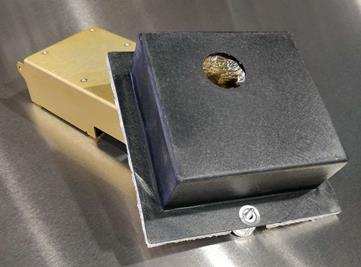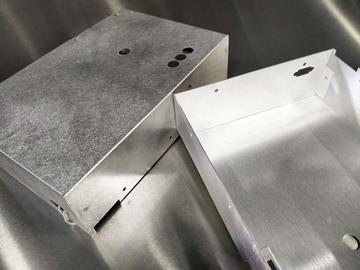Since Stanron Steel Specialties opened our precision facility in 1972, we have been committed to providing the finest and most versatile services that the industry has to offer. We have performed our long and short-run fabrication, assembly, drilling, welding, stamping, grinding, and prototyping services for a wide variety of industries, including communication, aerospace, healthcare, technology, and many others from our shop in Ft. Lauderdale, Florida, where we have met our clients’ needs both domestically and across the globe.
Precision Surface Finishing Services
In addition to our top-quality fabrication services, we also offer a full range of finishing options for your specific application and needs. Here are some of the finishing services we can perform once the fabrication process is complete.
Anodized Finishes
Anodizing is used to thicken the oxide layer on the surface of aluminum components. The process is also known as electrolytic passivation. When a piece of metal is anodized, it is much more resistant to wear and other forms of corrosion. This procedure also provides much better adhesion for primers and glues, as compared to bare metal. 
Dip Brazing
Dip Brazing is a process in which two pieces of metal are joined together by introducing filler metal between interfaces. The filler metal is heated to above 900 F and is applied to the surfaces. When it cools down, it returns to a solid state which creates a firm metallic bond between the metals. This process is very different than welding or spot welding and is used more commonly in industries such as aerospace and military defense.
Passivation
Passivation is a process that refers to stainless steel becoming passive, or returning to a passive state. This means that the metal is less effected or corroded by the environment. The passivation process typically uses nitric or citric acid to remove free iron from the surfaces. The chemical removal of free iron from the surfaces creates a thin oxide layer that exposes more chromium, thus creating a non-reactive surface for more protection against rust.
Penetrant Inspection
Penetrant Inspection is one of the oldest and most effective NDT (Non-Destructive Testing) methods. It is used to detect defects in metal such as cracks or fractures by applying a dye to the surfaces. Fluorescent penetrants can contain multiple dyes that fluoresce when exposed to ultraviolet radiation (blacklight) and is done in a darkened environment to observe the brilliant colors. This method can detect discontinuities as narrow as 150 nanometers.
Plating
Plating is a process that is very cost affective if you require the properties of a certain type material. Tin plating or Nickel plating for example, is often used for its non-corrosive properties and can help protect your materials from wear and tear. Nickel plating also has great adhesion properties and is used as an undercoat for coatings such as chromium. Stanron Steel Specialties work closely with vendors who offer a variety of plating solutions for all your needs.
Silk Screening
Silk Screening is method that is used to print words or images on materials. The material goes through a cleaning process to ensure proper adhesion of the artwork. After the material is cleaned, a screen is applied over the surface with the desired artwork and a paint or ink is applied to the screen. After the screen is removed, the layout of the screen will be visible on the product and will adhere to withstand most elements. This is a common application for the medical, industrial and electronic industries.
Painted Finishes
Painting metal surfaces is another very effective way to ensure corrosion resistance and prevent rust from forming on a part. Many paint types can apply to metal, with the best choices being oil or enamel. Latex is also an available option, but for optimal adhesion, coverage, and the prevention of wear, oil or enamel are preferred.
Clear Coat Finishes
Clear coat is paint, but it is transparent. It does a very good job of protecting underlying layers of paint. It provides an attractive, glossy finish to any metal part. Besides, clear coat can protect a piece of metal from harmful ultraviolet rays that can cause the paint to fade over time. Lastly, any scratches or blemishes found on a coat of paint covered with clear can be easily buffed out.

Polished Finishes
Some parts require them to go through a polishing process. Many types of polished finishes can be applied to metal, depending on the need and application of the product. While some polishing is done to prepare metal for powder coating or anodizing, other polishing techniques can produce a mirror finish or reflective finish appearance on a part.
Steel Finishes Experts
Contact Us Today
For over four decades, the professionals at Stanron Steel Specialties have been providing the best finishing services in the industry. Whether you are looking for an anodized, painted, clear coat, abrasive, or a polished finish for your components, you can depend on us to provide top quality results with every project. We are proud of the outstanding reputation we have earned with our customers during our many years in business.
Stanron Steel Specialties works closely with NADCAP approved vendors and takes pride in supplying RoHS3 compliant products to many industries.
Contact us today to learn more about how we can expertly handle all of your metal finishing needs. Find out more about why so many companies have put their trust in us as their partner of choice since 1972.